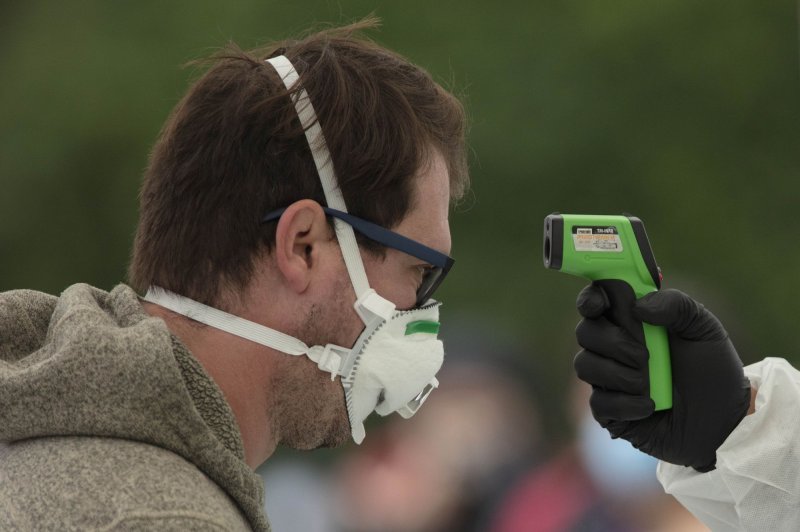1 of 2 | Many people hospitalized with COVID-19 and discharged end up returning due to persistent symptoms, including fever, according to recent research. File Photo by Peter DaSilva/UPI |
License Photo
May 26 (UPI) -- Nearly 75% of people with COVID-19 experience symptoms of the disease weeks after diagnosis, an analysis published Wednesday by JAMA Network Open found.
The most frequently reported lingering symptoms were were fatigue, by 40% of those infected, and shortness of breath or difficulty breathing, by 36% of those infected, the data showed.
In addition, nearly 30% reported difficulty sleeping or insomnia, the researchers said.
For the purposes of the analysis, persistent symptoms were defined as those lasting for at least 60 days after diagnosis, symptom onset or hospitalization, or at least 30 days after recovery or hospital discharge.
About 85% of the COVID-19 patients included in the analysis had to be hospitalized when first diagnosed, according to the researchers.
"So these numbers apply mainly to those with moderate to severe initial illness," study co-author Dr. Steven Goodman told UPI in an email.
"That said, the numbers were so high ... the implications [are significant] ... because of the millions of people who have had COVID-19," said Goodman, associate dean of clinical and translational research at Stanford University School of Medicine in Palo Alto, Calif.
For some, these persistent symptoms are "debilitating" and "disabling," impacting the ability to work and engage in day-to-day activities for long periods, even after "recovery from the acute illness," he said.
Millions of people worldwide have experienced so-called "long COVID-19," or symptoms that persist for up to nine months following initial recovery, research suggests.
As many as 10% of those hospitalized with the disease and then discharged end up returning for additional care, according to another recent study.
For the new analysis, Goodman and his colleagues reviewed 45 studies that reported on symptoms that met their criteria for "persistent."
The studies included in the analysis collectively enrolled nearly 10,000 participants, and 30 of them focused on adults younger than 60, the researchers said.
Nearly 73% of the participants in the included studies reported persistent symptoms from COVID-19.
In addition to fatigue and breathing and sleep problems, other common persistent symptoms include mobility issues and memory loss, cough and fever, the researchers said.
Each of these symptoms was reported in up to 25% of participants in the included studies, while symptoms of depression and anxiety were found in up to 20%.
"COVID-19 does not end with recovery from the acute illness," Goodman said. "Even if the proportions of disabling disease are far lower than these overall numbers, that still represents a huge burden both for individuals and the public, because we have had at least 33 million cases."
January 31, 2020
National Institutes of Health official Dr. Anthony Fauci (C) speaks about the coronavirus during a press briefing at the White House in Washington, D.C. Health and Human Services Secretary Alexander Azar (L) announced that the United States is declaring the virus a public health emergency and issued a federal quarantine order of 14 days for 195 Americans. Photo by Leigh Vogel/UPI |
License Photo
















